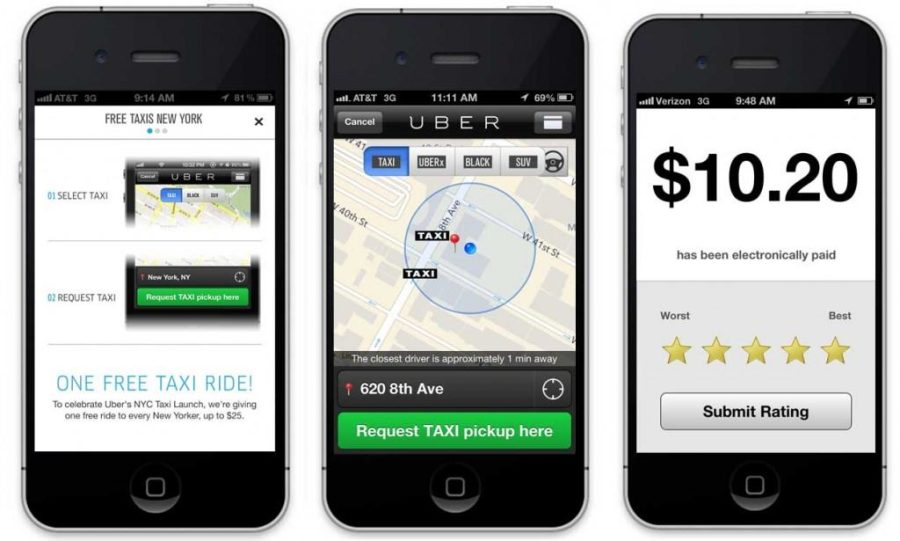Startup smartphone-based ridesharing services like Uber, Lyft, and Sidecar are increasing in popularity — and edging out taxis — due to their flexible schedules and affordable pricing.
Accountability and Safety Must Be Prioritized, Along With ConvenienceWhile ride sharing is convenient and economical, the reliability of unregulated citizen drivers is highly problematic. Companies like Uber, Lyft and Sidecar, which utilize smartphone apps to provide informal and on-demand transportation, have evaded policies regarding passenger safety, driver qualifications and liability concerns. According to The Huffington Post, Uber has already been charged with licensing offenses, served with cease-and-desist orders and banned in some states, illustrating their disregard for standards of professionalization.
Because they operate privately, ride-sharing companies have fought for exemption from the regulations of city Public Utilities Committees. Such resistance has elicited a negative response from the International Association of Transportation Regulators, which has supported local efforts to “curb the unsafe, unregulated expansion of rogue car service apps.” While these companies’ informality has its benefits, “peer-to-peer transportation” should supplement — and not substitute — a qualified and safety-conscious driver workforce.
Moreover, the ridesharing companies’ failure to implement stringent rules has led to conflicts regarding insurance. Geico recently denied coverage for a Lyft driver involved in an accident because the driver’s personal automobile insurance coverage is insufficient when carrying commercial passengers. These incidents highlight a lack of accountability, as it is still unclear who would be held liable in the event of a mishap.
The ride-sharing business is undoubtedly a progressive movement. However, safety and appropriate licensing should not be sacrificed for the benefit of proprietors. If these companies wish to prosper in the long run, professionalization and passenger safety should remain undisputed priorities.
— Morgan Jong, Contributing Writer Ridesharing Serivces Provide Healthy Competition in Transportation SectorTaxis may have been the workhorse of convenient transportation for individuals in another era, but it is time for them to revamp the way they work. Ridesharing companies such as Lyft and Uber are quickly making a sizable dent in the market share of taxi services. In order to compete, taxis will need to become less costly and figure out a new approach that will give them an edge in the race to transport.
Taxis have long been a quick way for the average person to travel, but their exorbitant prices and the difficulty associated with hailing them have made taxi travel unappealing. These shortcomings make ridesharing services a much cheaper (and oftentimes quicker) alternative. Instead of hailing a cab on the street or contacting a taxi service to contact a driver, rideshare companies use smartphone apps to connect users and orchestrate rides. Users are given the opportunity to directly interact with drivers for a smooth experience.
The streamlined ridesharing process has earned many positive responses from its users. In major metropolitan areas such as Seattle, many citizens have been embracing ridesharing despite the city’s competition between taxi companies and rideshare services. Reddit users have voiced their disatisfaction with taxi services’ unreliable, inconvenient monopoly on individual transportation.
Although ridesharing is a fairly new concept, it has taken root and had success in major cities across America over the past five years. The companies at the forefront of this revolution are quickly making sure that taxis will no longer have a stranglehold on the personal transportation sector, providing some healthy, long-overdue competition.
— Charu Mehra, Contributing Writer Companies’ Price Advantages and Flexibility Are Ideal for StudentsThe recent development of smartphone-based ridesharing companies, such as Uber, Lyft and Sidecar, has raised controversy in regards to safety concerns and their legitimacy as bona fide transportation services. Despite these concerns, the state of California approved regulations for these ridesharing companies on Sept. 19, making it an official transportation category in California that is here to stay.
Given the ongoing transportation changes, this approval will ultimately prove economically beneficial to students who cannot afford alternative modes of transportation.
These services provide an economical and convenient option for both San Diego residents and college students. Many ridesharing companies do not have a set price but rather suggest a donation that the customer can make to the driver. And while it is suggested that passengers pay that suggested donation, it is not necessary for every company or service. These flexible and affordable services are ideal for a college student on a budget, who can only pay as much as their income allows.
For students who use the bus infrequently, ridesharing services may be the quickest and most economical way to go on the occasional off-campus trip. Currently, students who don’t own a car get to downtown San Diego by taking the MTS 150 bus route, which takes an average of 40 minutes. In comparison, the trip on a service such as Uber could take only 20 minutes by car, not including waiting times.
By embracing ridesharing, UCSD students will have a more convenient and affordable means at getting themselves to certain places, rather than relying on a transportation system that they have no control over.
— Sharon Lay, Staff Writer





martyhill • Nov 14, 2013 at 12:25 am
Try UBER, it is an awesome car service… always reliable and super clean cars!!
Get $10 off your first ride
use link: http://www.uber.com/invite/ubernew10off
or enter PROMO code
ubernew10off